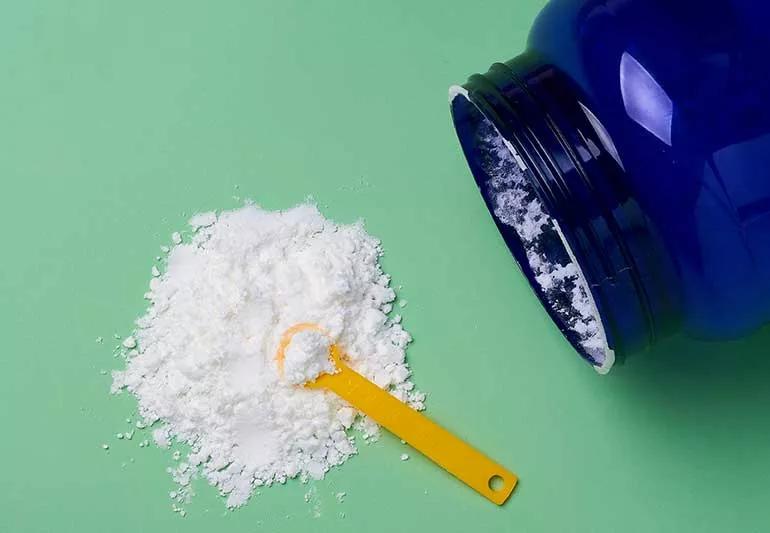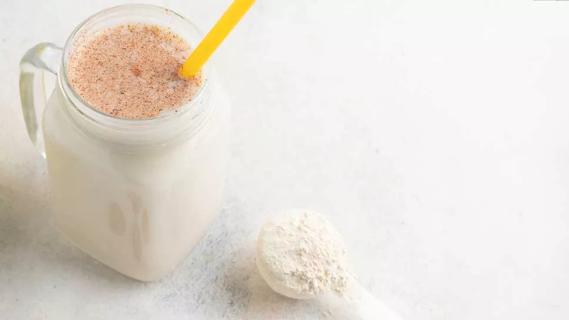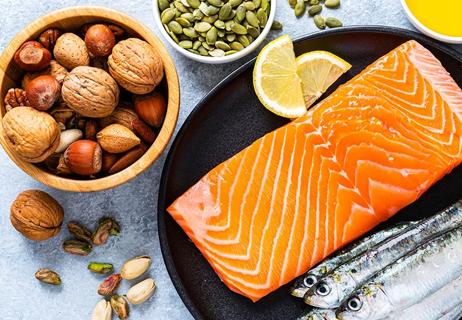This amino acid is in lots of energy drinks, but our bodies already make all we need

If you’re an energy drink aficionado, chances are you’ve come across the word “taurine” a time or two. Sometimes, you see the phrase “With taurine” printed on the can. In other cases, the drinks proudly announce that they don’t contain the amino acid.
Advertisement
Cleveland Clinic is a non-profit academic medical center. Advertising on our site helps support our mission. We do not endorse non-Cleveland Clinic products or services. Policy
It raises an inevitable question: What the heck is taurine? And is it healthy?
We asked registered dietitian Julia Zumpano, RD, LD. She explains what taurine is, its risks and benefits and whether supplementation is a good idea.
Taurine is an amino acid — that is, an organic compound used to make proteins. There are hundreds of amino acids that exist in nature, but only nine are essential for human life. Taurine isn’t one of them. Our bodies naturally produce it, but they don’t use it to synthesize protein, so taurine is considered a semi-essential (or conditionally essential) amino acid.
But the fact that taurine isn’t essential doesn’t make it unimportant. You can find it throughout the body — in places like your brain, eyes, heart and muscles. And it plays a role in a number of different physical processes.
“Taurine has important functions in the heart, brain and immune system,” Zumpano explains. “It helps support nerve growth, helps us maintain proper hydration and produces bile salts, which help in digestion. Taurine also regulates minerals and supports the general function of your nervous system, vision and eyes.”
She adds that, while it’s not usually essential, our bodies will produce the taurine we need in times of severe illness or stress. And when she says “severe illness,” Zumpano is referring to diseases such as heart or kidney failure.
Advertisement
While our bodies naturally produce taurine, you can also get it from meat, seafood and dairy.
“Vegans and vegetarians consume a much lower quantity of taurine when compared to people who eat meat,” Zumpano notes, “so they do tend to have lower taurine levels.” But she’s quick to remind that that’s really only a problem if somebody is critically ill and needs extra immune support.
Scientists first identified taurine in bull bile. And beef is rich in the stuff. So, it’s not surprising that some people associate the amino acid with bulls.
But for reasons that aren’t entirely clear, a myth has proliferated that the taurine you find in energy drinks comes from bull sperm. That’s false. In fact, the taurine found in energy drinks isn’t derived from animals at all: It’s plant based. There are plenty of reasons to avoid energy drinks, but bull sperm’s not one of them.
The health benefits of taurine can be split into two categories: The ones we know about and the claims that — while promising — need more research.
We don’t know as much about taurine as you might think. As is the case with most amino acids and supplements, there’s not a tremendous amount of clinical research being done on the topic. So, when we talk about taurine’s health benefits, we have to be clear about which properties have been established and which properties we’re still trying to confirm.
Zumpano says that taurine helps your body:
The clinical benefits of taurine haven’t been extensively studied, especially in isolation. That means, while studies are promising, it’s hard to know whether any of the benefits listed below are accurate:
Advertisement
According to Zumpano, we don’t know as much as we should about the side effects of taurine. That’s partially because taurine is rarely studied on its own. Studies that look at the safety of energy drinks, for example, can’t specify whether a side effect is the result of the taurine in the beverage, as opposed to the guarana, ginseng, caffeine, sugar, etc.
“There have been some side effects reported in people who take excessive taurine, like vomiting, nausea, liver pain, headache and stomach pain,” Zumpano says. “But it was unclear whether these side effects, according to the study, were related to the amino acid, or maybe a different ingredient taken alongside the taurine.”
While there’s a lot we don’t know about the side effects of taurine, we do know that it can interact with certain kinds of medications.
Zumpano explains that taurine works as a cytochrome P-450 enzyme inhibitor.
“That means that taurine interferes with medications that rely on this enzyme to metabolize drugs,” she clarifies. And the medications in question are pretty darned important — we’re talking about antidepressants, antiseizure drugs, blood thinners (anticoagulants) and statins.
While the amount of taurine in your favorite energy drink isn’t substantial enough to interact with your medications, it’s important to talk with your healthcare provider about these potential interactions if you’re considering taurine supplementation.
Advertisement
Why do energy drinks and supplement companies make such a big deal about taurine? Zumpano suspects it’s a result of the claims that it can improve athletic performance.
So, what exactly are you drinking when you consume an energy drink that has “with taurine” printed on the label? The taurine in your beverage or pill bottle isn’t the same as a taurine your body makes itself. So, where is it coming from?
“Supplemental taurine is synthetic,” Zumpano states. “It’s made from other amino acids: Cysteine and methionine, which makes it plant-based, and safe for vegetarians and vegans.”
Energy drinks and supplements are usually safe to consume regardless of your dietary restrictions. But that doesn’t mean they’re a good idea. While potentially beneficial for older people, evidence suggests that energy drink consumption by children and adolescents is risky. And most energy drinks are high in sugar and caffeine.
If energy drinks aren’t the best way to get taurine, what is?
At this point you may still be wondering if you need to be taking a taurine supplement. The short and sweet answer is, no.
Now for the long answer.
As it’s a conditionally essential (semi-essential) amino acid (and, again, one you produce naturally), it doesn’t particularly matter how much taurine you have in your body. While you can technically get your taurine levels tested, Zumpano says it’s “not common at all in conventional medicine.” Not only does that mean you’d need to seek out a provider to test your taurine levels, but you’d also probably have to pay for that test out of pocket.
Advertisement
Zumpano doesn’t recommend taurine supplements either. “For the most part, people are either consuming enough protein or your body is adjusting to make sure you’re getting what you need by creating and making taurine out of the other amino acids.
“Now, if someone got tested and they were low on taurine or any of the other amino acids,” Zumpano continues, “then I may recommend a supplementation trial, or a diet change that would better support those amino acids.”
We mentioned earlier that vegetarians and vegans tend to have lower taurine levels. While most taurine supplements are safe for vegans or vegetarians, Zumpano emphasizes, “It’s unlikely for you to have a deficiency unless your body is in a state of stress or it needs more immune support.”
Like many providers, Zumpano feels that supplements aren’t something you should play around with. “Supplements are not regulated as drugs are in this country, so if you did decide to take a taurine supplement, you’d want to make sure you’re choosing one that’s third party tested.
“That means someone’s checking in to make sure that what the company says is in there truly is in there.”
In addition to doing your research, Zumpano urges you to check in with your healthcare provider before starting any new supplements. That’s always important, but the fact that taurine is known to interact with several medications makes it critical.
“Your doctor or healthcare provider may not know anything about taurine,” Zumpano notes, “but you can find a practitioner or registered dietitian that does, or ask your current provider to help you navigate the information and determine whether it’s the right choice for you.”
While Zumpano isn’t in the habit of recommending taurine supplements, there are some basic changes you can make to your diet that could, potentially, have a similar effect.
“I tend to encourage a higher protein diet,” Zumpano says. She explains that this approach is helpful for both weight management and disease management. Getting lean and varied proteins may be a bit more indirect, but it’s conducive to making sure you get enough of your amino acids.
“If anything, I’m more likely to suggest a whey, plant based or collagen protein powder than I am to recommend a supplement. Protein powders have all the essential amino acids,” she adds.
Taurine is a conditional — meaning nonessential — amino acid that your body produces itself.
It serves many important functions in your body, but much more research is needed to confirm all of its potential benefits. And we often see taurine in energy drinks because there’s preliminary evidence to suggest it can improve athletic performance.
But breathe easy: Again contrary to somewhat popular belief, the taurine you get in energy drinks is not made of bull sperm. It’s synthetic, which means it’s safe for vegetarians and vegans.
And supplementation is only recommended when a person is critically ill and needs additional immune support. For the rest of us, eating a diet that’s rich in proteins and amino acids is sufficient.
Learn more about our editorial process.
Advertisement

Leucine is an amino acid that helps you build muscle — it’s found in both plant and animal protein

Adding protein powder to coffee can provide benefits, but ‘proffee’ is no substitute for nutritious food

While rare in the U.S., signs that you’re not getting enough of this essential macronutrient include muscle loss, skin changes and a weak immune system

The concept of morning protein and exercise isn’t backed by research but may have some potential benefits

Bone broth may help maintain strong bones, improve gut health and even lessen joint pain

The general rule is 0.8 to 1 gram of protein per kilogram of body weight — but that may not be right for you

This edible insect powder can be a good source of protein, fiber and other nutrients

Some options like chicken breast and beans are better for you than processed meats or dairy

If you’re feeling short of breath, sleep can be tough — propping yourself up or sleeping on your side may help

If you fear the unknown or find yourself needing reassurance often, you may identify with this attachment style

If you’re looking to boost your gut health, it’s better to get fiber from whole foods